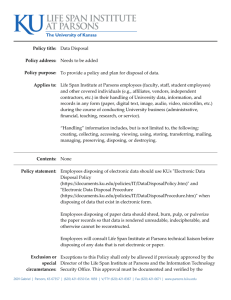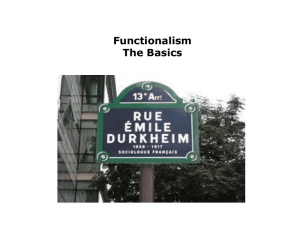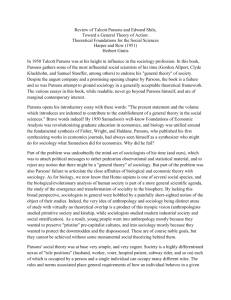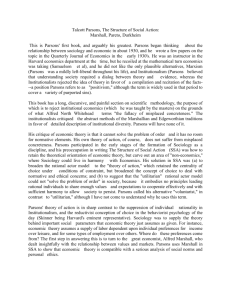The four functions performed by the nuclear family according to
advertisement
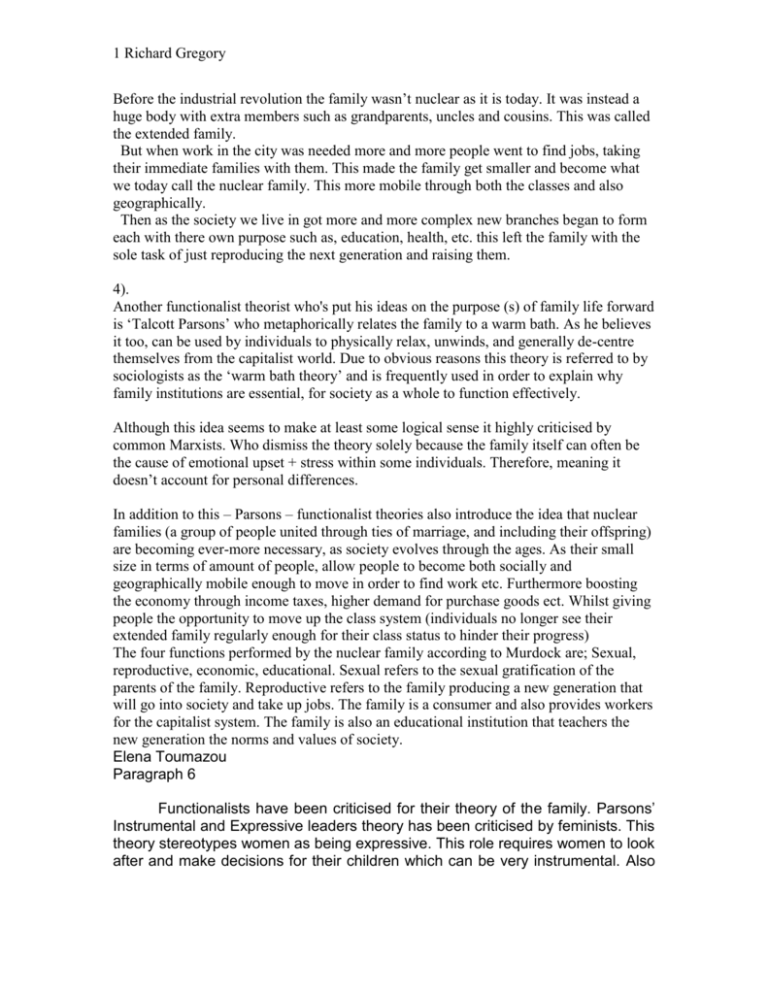
1 Richard Gregory Before the industrial revolution the family wasn’t nuclear as it is today. It was instead a huge body with extra members such as grandparents, uncles and cousins. This was called the extended family. But when work in the city was needed more and more people went to find jobs, taking their immediate families with them. This made the family get smaller and become what we today call the nuclear family. This more mobile through both the classes and also geographically. Then as the society we live in got more and more complex new branches began to form each with there own purpose such as, education, health, etc. this left the family with the sole task of just reproducing the next generation and raising them. 4). Another functionalist theorist who's put his ideas on the purpose (s) of family life forward is ‘Talcott Parsons’ who metaphorically relates the family to a warm bath. As he believes it too, can be used by individuals to physically relax, unwinds, and generally de-centre themselves from the capitalist world. Due to obvious reasons this theory is referred to by sociologists as the ‘warm bath theory’ and is frequently used in order to explain why family institutions are essential, for society as a whole to function effectively. Although this idea seems to make at least some logical sense it highly criticised by common Marxists. Who dismiss the theory solely because the family itself can often be the cause of emotional upset + stress within some individuals. Therefore, meaning it doesn’t account for personal differences. In addition to this – Parsons – functionalist theories also introduce the idea that nuclear families (a group of people united through ties of marriage, and including their offspring) are becoming ever-more necessary, as society evolves through the ages. As their small size in terms of amount of people, allow people to become both socially and geographically mobile enough to move in order to find work etc. Furthermore boosting the economy through income taxes, higher demand for purchase goods ect. Whilst giving people the opportunity to move up the class system (individuals no longer see their extended family regularly enough for their class status to hinder their progress) The four functions performed by the nuclear family according to Murdock are; Sexual, reproductive, economic, educational. Sexual refers to the sexual gratification of the parents of the family. Reproductive refers to the family producing a new generation that will go into society and take up jobs. The family is a consumer and also provides workers for the capitalist system. The family is also an educational institution that teachers the new generation the norms and values of society. Elena Toumazou Paragraph 6 Functionalists have been criticised for their theory of the family. Parsons’ Instrumental and Expressive leaders theory has been criticised by feminists. This theory stereotypes women as being expressive. This role requires women to look after and make decisions for their children which can be very instrumental. Also 1 Richard Gregory in some nuclear families the men are expressive and the women take the instrumental role. Functionalists’ theory of the family sees the nuclear family as being stable and good for the society. Murdock conducted a study using 250 societies and concluded that the family is universal and can be found everywhere. He also found that there are four functions of the family. They are sexual; reproduction; economic and education. He emphasised the role of sexual and explained that it provides sexual gratificationr the spouses. It also strengthens the family as the most binding emotions that accompany sexual activity bind husband and wife. Paragraph 5 Kate Barker Parson’s functionalist views on the family also include the family having two major roles, the males instrumental position and the female expressive role. The theory is that the male is the decision maker the female the problem solver and that this is essential to keep a family happy and together. Parsons sums up the functions of the family by saying it has two basic purposes, the first to socialise children and the second the stabilization of adult personalities. The element of retreat is key to maintaining social control and avoiding anomie in society. By Frances Spivey 4) Parsons came up with the theory of the warm bath; he compared the family to a warm bath. Parsons said that the family provides the traditional role of that an individual can relax and de-stress into a loving and caring environment. He states that the family makes life worthwhile. Parsons also says the family needs to be socially and geographically mobile. By being geographically mobile you are able to move around the country in order to attain better jobs. Socially mobile is that you are able to move up and down the social class system, the gaps have increased in generations and it is essential to be able to move up and down. Parsons says that it is easier to do this in a nuclear family than in an extended family unit. 1. Introduction – layla Ahmed. Functionalists believe and say that the families are the main institution in society and it makes up the building blocks of it. It provides stability and a new generation to be assimilated and take up the jobs of the people in society around them. Functionalists also believe families have evolved from extended families into nuclear families throughout the years due to changes in society. Paragraph 3 Emile Durkheim put forward his views on the family and suggested that society has evolved and become more complex. A feature of this social evolution is that is that Capitalist society has become increasing debauched and subhuman practices had become acceptable. Immoral practices such as wife battery, child abuse, teenage pregnancies, divorce and disobedience have crept into Capitalist family and overall, the traditional notion of the family has been polluted by the ‘evolution’ of Capitalist society. Thcomplexity of society can be found in the way major organisations function. The 1 Richard Gregory various roles within an organisation have become appropriately allocated and the overall jobs contribute to the running of the organisation. Moreover, nowadays, the basic function of the family is simply just to raise the children. The education system takes care of the child’s education and the NHS takes care of the children’s health needs. The social organisations can punish the parents for not raising the children properly. Asif Munaf By Frances Spivey 4) Parsons came up with the theory of the warm bath; he compared the family to a warm bath. Parsons said that the family provides the traditional role of that an individual can relax and de-stress into a loving and caring environment. He states that the family makes life worthwhile. Parsons also says the family needs to be socially and geographically mobile. By being geographically mobile you are able to move around the country in order to attain better jobs. Socially mobile is that you are able to move up and down the social class system, the gaps have increased in generations and it is essential to be able to move up and down. Parsons says that it is easier to do this in a nuclear family than in an extended family unit. However other sociologists challenge the idea that the family is good the theory that the family has evolved from the extended family to the nuclear family due to industrialization its criticised by Laslett who found that nuclear families were common before industrialization and by Litwack who found that the extended family is still a major family form. A criticism of Parsons warm bath theory is by Marxist feminists who believe that the family is only a warm bath for men and this is shown by Fran Ansley and the outcome of domestic violence. Marxist’s criticise functionalists and believe that the family is good as theorist like Althusser argue that it supports capitalism Conclusion Functionalists have a very idealistic view of the family and it doesn’t apply in most cases to real life.




